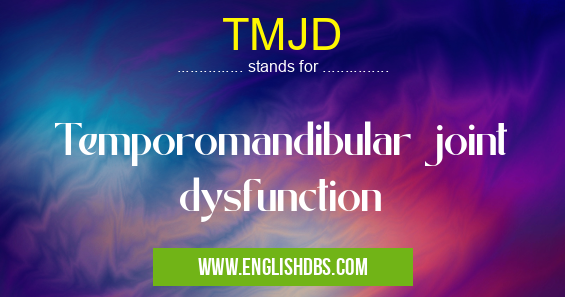What does TMJD mean in SURGICAL
TMJD (Temporomandibular Joint Dysfunction) is a condition that affects the temporomandibular joint (TMJ), which connects the lower jaw (mandible) to the skull. TMJD can cause pain, clicking, popping, and sometimes locking of the jaw, making it difficult to open and close the mouth.

TMJD meaning in Surgical in Medical
TMJD mostly used in an acronym Surgical in Category Medical that means Temporomandibular joint dysfunction
Shorthand: TMJD,
Full Form: Temporomandibular joint dysfunction
For more information of "Temporomandibular joint dysfunction", see the section below.
Causes of TMJD
- Muscle tension or spasm: The muscles around the TMJ can become tense or go into spasm, putting pressure on the joint.
- Dislocated or damaged jaw joint: The TMJ can become dislocated or damaged due to trauma, such as a blow to the face.
- Arthritis: Degenerative joint disease can affect the TMJ, causing pain and stiffness.
- Bruxism (teeth grinding): Grinding or clenching the teeth can put stress on the TMJ.
- Misaligned bite: An improper bite can cause the TMJ to become misaligned.
- Stress: Emotional stress can contribute to muscle tension and TMJ dysfunction.
Symptoms of TMJD
- Pain in the jaw, face, or ears
- Clicking, popping, or grinding sounds when opening or closing the mouth
- Difficulty opening or closing the mouth
- Jaw locking
- Headaches
- Earaches
- Dizziness
Diagnosis and Treatment of TMJD
Diagnosis of TMJD involves a physical examination of the TMJ and a discussion of symptoms. Treatment options for TMJD include:
- Non-surgical treatments:
- Pain relievers and anti-inflammatories
- Physical therapy to strengthen the jaw muscles
- Splint or mouth guard to reduce stress on the TMJ
- Stress management techniques
- Surgical treatments:
- Surgery may be considered in severe cases where non-surgical treatments have failed.
Essential Questions and Answers on Temporomandibular joint dysfunction in "MEDICAL»SURGICAL"
What is TMJD?
Temporomandibular joint dysfunction (TMJD) is a condition characterized by pain and dysfunction in the temporomandibular joint (TMJ), which connects the jawbone to the skull.
What are the symptoms of TMJD?
Symptoms of TMJD can include jaw pain, clicking or popping sounds in the jaw, difficulty opening or closing the mouth, headaches, and facial pain.
What causes TMJD?
The exact cause of TMJD is often unknown, but it can be caused by factors such as trauma to the jaw, teeth grinding (bruxism), and stress.
How is TMJD diagnosed?
TMJD is diagnosed through a physical examination of the jaw and mouth, as well as a review of the patient's symptoms and medical history.
How is TMJD treated?
Treatment for TMJD may include pain relievers, jaw exercises, stress management techniques, and in some cases, surgery.
Can TMJD be prevented?
While some cases of TMJD cannot be prevented, there are some things that can be done to reduce the risk, such as avoiding teeth grinding, managing stress, and maintaining good oral hygiene.
Final Words: TMJD is a common condition that can affect people of all ages. It is important to seek medical attention if you experience any symptoms of TMJD, as early diagnosis and treatment can help prevent further damage to the TMJ and improve overall quality of life.
TMJD also stands for: |
|
| All stands for TMJD |
